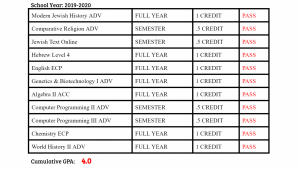Con
May 14, 2020
To the average teenager, hearing that they don’t need perfect grades to pass a class decreases their motivation to work as hard as they would to get an A. If you only have to do the bare minimum, and no one would ever know, why would you put in the extra time and effort? And if you choose to go above and beyond, is it fair to be considered the same as people who don’t?
At the beginning of the fourth marking period, Montgomery County Public Schools announced that the final quarter of the 2019-2020 school year would be a pass/fail grading system for high school students. Although it may alleviate short-term grading pressure, in the long term, this system leaves students at a greater disadvantage, which is why CESJDS should not adopt it.
A pass/fail system typically allows students to pass a class with a minimum grade of a C. This gives students a lot of leeway in terms of how they choose to participate in their education.
While a pass/fail system levels the playing field, it adds a disadvantage to students in the college application process. By allowing everyone to pass a class, it stops colleges from being able to distinguish students from their peers. You could have two students both passing a class, and under normal circumstances, one would receive an A and the other would receive a C, yet on transcripts, they look the same and are therefore considered the same when it comes to applying to college.
Not only would their transcripts look the same, but it would raise the grade point averages of students who aren’t normally putting in the work and effort by either adding a letter to their grade from the previous marking period.
For students who put in minimal effort to pass a class, they lose out on critical educational skills for their future, such as advanced writing skills, communication abilities, and how to study for final exams. It creates a poorer sense of accomplishment and sets a working standard that wouldn’t be successful in college and the workforce.
By proceeding with as many normal standards and routines as possible, JDS continues to maintain the quality of its education. When Maryland Governor Larry Hogan announced the closures of schools on Thursday, March 12, JDS resumed classes after two professional days. Since then, the teachers have been able to provide quality lessons that are deserving of letter grades for the active work that students have been participating in for two months.
By assigning the normal workload and maintaining normal grading habits, schools are able to provide their students with a sense of normalcy during this challenging time, all the while not skimping on critical academic skills students need for the future.
Schools should be taking this opportunity to teach students how to adapt to different learning circumstances and build on their academic skills, rather than allowing them to fall into poor working habits.



















n • Jun 3, 2020 at 2:57 pm
I agree